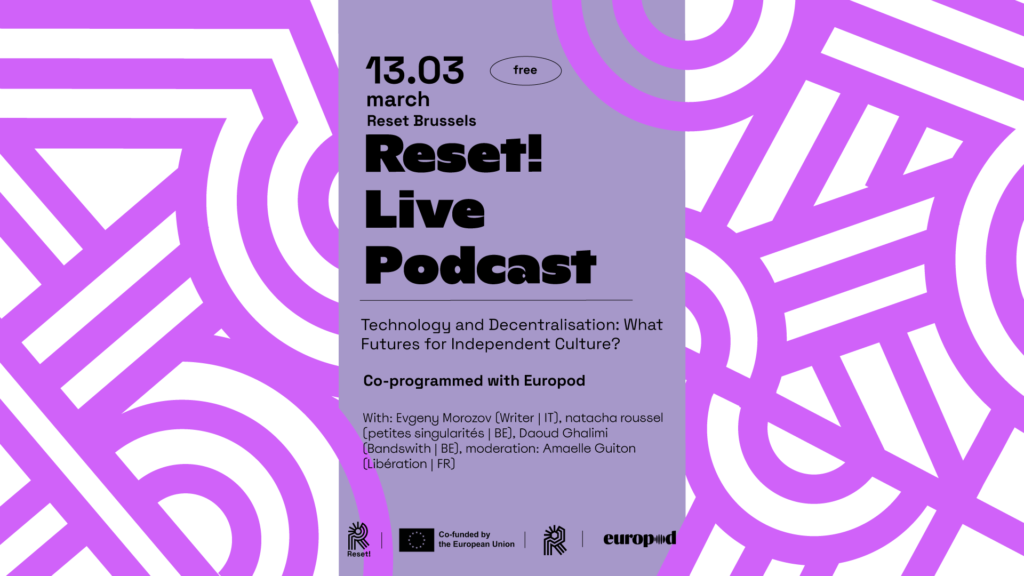Live Podcast #4: Independent Voices Face High Ownership Concentration: Mapping the Cultural Landscape
In 2024, Reset! is heading to Brussels, returning to the network’s origins, at the Reset venue. Dedicated to championing independent cultural and media organisations throughout Europe, Reset! will delve into the challenges faced by independent cultural and media organisations across the continent through a series of open recorded discussions.
How can the current technology landscape, dominated by MAGMA (Microsoft, Amazon, Google, Meta, Apple), be restructured to support, not endanger, Europe’s independent cultural scene and democracies? Exploring alternative tech projects offers a fresh perspective. Reset!, a network supporting independent cultural and media organisations, has delved into this for two years and will unveil a volume of its atlas in 2024 on this topic. To kick off a new live podcast recording series at Brussels-based Reset venue, the network joins forces with Europod, the European Podcast Network, to host an exchange with Evgeny Morozov on this topic. Aligned with the launch of Europod’s translation of ‘The Santiago Boys’ podcast, Morozov explores technology democratisation and misuse through Allende’s project, aiming to provide a framework for thinking beyond the current big platform hegemony in the European public sphere. Morozov will engage with European political actors and independent cultural sector representatives (including Reset! member Daoud Ghalimi from Bandswith) to explore the reclaiming of technology to support independent cultural initiatives and discuss decentralised technology in culture.
Co-programmed by Europod to mark the launch of the podcast Les Santiago Boys.
Speakers:
- Evgeny Morozov (Cyber-activist | BY)
- natacha roussel (petites singularités | BE)
- Daoud Ghalimi (Bandswith | BE)
- Moderation: Amaelle Guiton (Journalist | FR)

Reset! Live Podcast #2: The Future of the Independent Cultural Scene in Ukraine: Support the Resilience
April 24 · 19:00
As we step into the third year of Russia’s full-scale invasion of Ukraine, how can the European cultural sector and society at large continue to extend support to the Ukrainian artistic scene, its emerging artists, and independent cultural organisations? Despite a sense of media fatigue potentially dampening the European public sphere’s engagement, Ukraine remains in need of assistance. Many organisations persist in their operations amid the war context, alongside the emergence of new collectives, venues, and projects. This discussion aims to address the role of the European cultural sector in connecting the dots with Ukrainian emerging artistic actors and forging connections with these new organisations and initiatives which are shaping tomorrow’s Ukrainian culture.
Reset! Live Podcast #3: Behind the Scenes: the Working Conditions Backstage of Independent Culture
May 22 · 19:00
In October of last year, the EU Parliament gave its backing to a directive aimed at improving working conditions within the cultural field. This marked a significant step as it marked the first time the Parliament has called upon the European Commission to establish a comprehensive legal framework within the EU to enhance social and professional standards in the cultural and creative industries. This push came at a crucial moment, with mounting concerns within the sector regarding equitable compensation for artists and the need for official recognition of the status of artists and cultural professionals in a sector that is constantly evolving. The urgency is particularly pronounced within the independent cultural sector, which faces not only economic challenges but also threats from authoritarian regimes all over Europe. In light of these challenges, it is vital to assess the current realities of working conditions within the independent cultural sector and explore avenues for improvement.
Reset! Live Podcast #4: Independent Voices Face High Ownership Concentration: Mapping the Cultural Landscape
June 26 · 19:00
Less documented than in the media landscape, the trend of concentration in the cultural sector is equally concerning. In 2023, this predatory behavior is evident in several areas. This is the case in the festival sector, with five major industrial groups having capital interests in approximately 150 festivals according to a study by Matthieu Barreira and Emmanuel Négrier published in the Nectart journal in 2022; in the publishing domain where “concentration has never been so significant” according to historian Jean-Yves Mollier; within the film industry, where concentration “leads to a shift in power dynamics in favor, on one hand, of these large distribution companies and, on the other hand, of large exploitation companies.” This phenomenon leads to similar effects in these sectors: standardization of creation, artistic homogenization, reduction of emergence, diversity, and pluralism. Faced with this trend, it is urgent to invent alternatives, based on cooperation models instead of competition.
